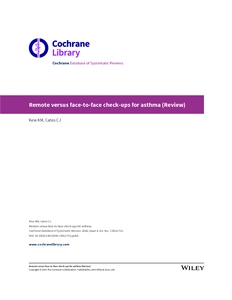Kew, KM; Cates, CJ
(2016)
Remote versus face-to-face check-ups for asthma.
Cochrane Database of Systematic Reviews, 4.
CD011715.
ISSN 1469-493X
https://doi.org/10.1002/14651858.CD011715.pub2
SGUL Authors: Cates, Christopher Joseph Kew, Kayleigh Marie
![[img]](https://openaccess.sgul.ac.uk/107870/1.hassmallThumbnailVersion/TELE1-AST.pdf)  Preview |
|
PDF
Published Version
Available under License ["licenses_description_publisher" not defined].
Download (676kB)
| Preview
|
Abstract
BACKGROUND: Asthma remains a significant cause of avoidable morbidity and mortality. Regular check-ups with a healthcare professional are essential to monitor symptoms and adjust medication.Health services worldwide are considering telephone and internet technologies as a way to manage the rising number of people with asthma and other long-term health conditions. This may serve to improve health and reduce the burden on emergency and inpatient services. Remote check-ups may represent an unobtrusive and efficient way of maintaining contact with patients, but it is uncertain whether conducting check-ups in this way is effective or whether it may have unexpected negative consequences. OBJECTIVES: To assess the safety and efficacy of conducting asthma check-ups remotely versus usual face-to-face consultations. SEARCH METHODS: We identified trials from the Cochrane Airways Review Group Specialised Register (CAGR) up to 24 November 2015. We also searched www.clinicaltrials.gov, the World Health Organization (WHO) trials portal, reference lists of other reviews and contacted trial authors for additional information. SELECTION CRITERIA: We included parallel randomised controlled trials (RCTs) of adults or children with asthma that compared remote check-ups conducted using any form of technology versus standard face-to-face consultations. We excluded studies that used automated telehealth interventions that did not include personalised contact with a health professional. We included studies reported as full-text articles, as abstracts only and unpublished data. DATA COLLECTION AND ANALYSIS: Two review authors screened the literature search results and independently extracted risk of bias and numerical data. We resolved any disagreements by consensus, and we contacted study authors for missing information.We analysed dichotomous data as odds ratios (ORs) using study participants as the unit of analysis, and continuous data as mean differences using the random-effects models. We rated all outcomes using the Grading of Recommendations Assessment, Development and Evaluation (GRADE) approach. MAIN RESULTS: Six studies including a total of 2100 participants met the inclusion criteria: we pooled four studies including 792 people in the main efficacy analyses, and presented the results of a cluster implementation study (n = 1213) and an oral steroid tapering study (n = 95) separately. Baseline characteristics relating to asthma severity were variable, but studies generally recruited people with asthma taking regular medications and excluded those with COPD or severe asthma. One study compared the two types of check-up for oral steroid tapering in severe refractory asthma and we assessed it as a separate question. The studies could not be blinded and dropout was high in four of the six studies, which may have biased the results.We could not say whether more people who had a remote check-up needed oral corticosteroids for an asthma exacerbation than those who were seen face-to-face because the confidence intervals (CIs) were very wide (OR 1.74, 95% CI 0.41 to 7.44; 278 participants; one study; low quality evidence). In the face-to-face check-up groups, 21 participants out of 1000 had exacerbations that required oral steroids over three months, compared to 36 (95% CI nine to 139) out of 1000 for the remote check-up group. Exacerbations that needed treatment in the Emergency Department (ED), hospital admission or an unscheduled healthcare visit all happened too infrequently to detect whether remote check-ups are a safe alternative to face-to-face consultations. Serious adverse events were not reported separately from the exacerbation outcomes.There was no difference in asthma control measured by the Asthma Control Questionnaire (ACQ) or in quality of life measured on the Asthma Quality of Life Questionnaire (AQLQ) between remote and face-to-face check-ups. We could rule out significant harm of remote check-ups for these outcomes but we were less confident because these outcomes are more prone to bias from lack of blinding.The larger implementation study that compared two general practice populations demonstrated that offering telephone check-ups and proactively phoning participants increased the number of people with asthma who received a review. However, we do not know whether the additional participants who had a telephone check-up subsequently benefited in asthma outcomes. AUTHORS' CONCLUSIONS: Current randomised evidence does not demonstrate any important differences between face-to-face and remote asthma check-ups in terms of exacerbations, asthma control or quality of life. There is insufficient information to rule out differences in efficacy, or to say whether or not remote asthma check-ups are a safe alternative to being seen face-to-face.
| Item Type: |
Article
|
| Additional Information: |
Copyright © 2016 The Cochrane Collaboration. Published by John Wiley & Sons, Ltd. This review is published as a Cochrane Review in the Cochrane Database of Systematic Reviews 2016, Issue 4. Cochrane Reviews are regularly updated as new evidence emerges and in response to comments and criticisms, and the Cochrane Database of Systematic Reviews should be consulted for the most recent version of the Review. Kew KM, Cates CJ. Remote versus face-to-face check-ups for asthma. Cochrane Database of Systematic Reviews 2016, Issue 4. Art. No.: CD011715. DOI: 10.1002/14651858.CD011715.pub2. |
| Keywords: |
General & Internal Medicine, 11 Medical And Health Sciences |
| SGUL Research Institute / Research Centre: |
Academic Structure > Population Health Research Institute (INPH) |
| Journal or Publication Title: |
Cochrane Database of Systematic Reviews |
| ISSN: |
1469-493X |
| Language: |
eng |
| Publisher License: |
Publisher's own licence |
| Projects: |
|
| PubMed ID: |
27087257 |
| Dates: |
| Date |
Event |
| 2016-04-18 |
Published |
| 2016-04-14 |
Accepted |
|
 |
Go to PubMed abstract |
| URI: |
https://openaccess.sgul.ac.uk/id/eprint/107870 |
| Publisher's version: |
https://doi.org/10.1002/14651858.CD011715.pub2 |
Statistics
Item downloaded times since 11 Nov 2016.
Actions (login required)
 |
Edit Item |



